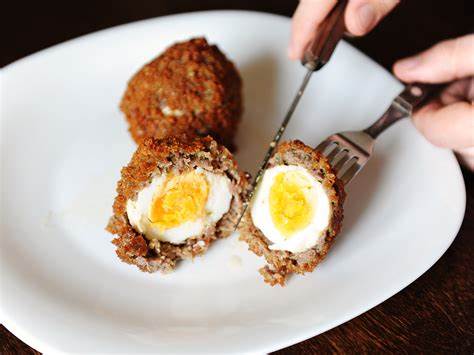How To Make Scotch Eggs - A Step-by-Step Guide
Scotch eggs are a classic British dish consisting of a soft or hard-boiled egg encased in sausage meat, coated in breadcrumbs, and then deep-fried or baked to perfection. This delightful snack is enjoyed both hot and cold, making it a versatile treat for various occasions.
May 15, 2024877 Shares62.6K Views

Scotch eggs are a classic British dish consisting of a soft or hard-boiled egg encased in sausage meat, coated in breadcrumbs, and then deep-fried or baked to perfection. This delightful snack is enjoyed both hot and cold, making it a versatile treat for various occasions.
Brief History Of Scotch Eggs
Scotch eggs have been around since the 18th century. The first recorded recipe dates back to 1809, attributed to Fortnum & Mason, a famous London department store. Originally designed as a portable snack for travelers, Scotch eggs have since become a beloved staple in British cuisine.
Popularity And Variations
Over the years, Scotch eggs have gained popularity worldwide, with numerous variations emerging. Some versions include different types of meat, spices, and even vegetarian options. The creativity in adapting the classic recipe keeps this dish relevant and exciting.
Ingredients Needed
Core Ingredients
- 4 large eggs
- 1 pound (450g) sausage meat
- 1 cup (120g) all-purpose flour
- 2 beaten eggs (for egg wash)
- 1 cup (120g) breadcrumbs
- Salt and pepper to taste
- Vegetable oil (for frying)
Optional Ingredients For Variations
- Herbs (parsley, thyme, or chives)
- Spices (paprika, garlic powder, or mustard powder)
- Additional meats (bacon, black pudding, or chorizo)
Equipment Required
Kitchen Tools And Utensils
- Saucepan (for boiling eggs)
- Mixing bowl
- Rolling pin (optional, for flattening sausage)
- Plastic wrap
- Deep frying pan or oven
- Slotted spoon
- Paper towels (for draining excess oil)
Step-by-Step Instructions
Preparing The Eggs
- Boiling the Eggs
- Cooling and Peeling the Eggs
Making The Sausage Mixture
- Choosing the Sausage
- Adding Seasonings
Wrapping The Eggs
- Divide the sausage meat into equal portions. Flatten each portion into a thin layer using your hands or a rolling pin. Place a peeled egg in the center and carefully wrap the sausage around the egg, ensuring it is fully encased.
- Encasing the Eggs in Sausage
Breading The Eggs
- Roll the sausage-covered egg in flour, then dip it into the beaten eggs, and finally coat it with breadcrumbs. Ensure an even coating for a crispy finish.
- Coating with Flour, Egg Wash, and Breadcrumbs
Cooking Methods
Deep Frying
- Instructions for Deep Frying
- Tips for Perfect Deep Frying
Baking
- Instructions for Baking
- Tips for Baking to Perfection
Serving Suggestions
Serving Temperature
Scotch eggs can be enjoyed both warm and cold. Serve them warm for a comforting meal or cold as a convenient snack.
Accompaniments And Dips
Pair Scotch eggs with mustard, aioli, or a tangy chutney. A fresh salad or pickles also make great accompaniments.
Storage Tips
How To Store Leftover Scotch Eggs
Store leftover Scotch eggs in an airtight container in the refrigerator for up to 3 days.
Reheating Instructions
Reheat in a preheated oven at 350°F (175°C) for 10-15 minutes or until heated through.
Health Considerations
Nutritional Information
Scotch eggs are high in protein but can be calorie-dense. Consider the nutritional content if you are mindful of your diet.
Healthier Alternatives
For a healthier option, use lean sausage meat, bake instead of frying, and opt for whole-grain breadcrumbs.
Common Mistakes To Avoid
Troubleshooting Tips
- Avoid overcooking the eggs during boiling.
- Ensure the sausage layer is evenly spread to prevent splitting during cooking.
- Maintain oil temperature for even frying.
How To Make Scotch Eggs - FAQs
What Are Scotch Eggs Traditionally Served With?
Scotch eggs are traditionally served with mustard, pickles, or a fresh salad. These accompaniments enhance the flavors and provide a refreshing contrast to the rich sausage and egg combination.
Can You Make Scotch Eggs With Different Types Of Meat?
Yes, you can make Scotch eggs with various meats such as chicken, turkey, or even a vegetarian sausage mix. The key is to ensure the meat is well-seasoned and properly cooked.
How Do You Prevent The Sausage From Splitting During Cooking?
To prevent the sausage from splitting, ensure it is evenly wrapped around the egg. Chilling the wrapped eggs before cooking can also help maintain their shape.
What Is The Best Way To Reheat Scotch Eggs?
The best way to reheat Scotch eggs is in a preheated oven at 350°F (175°C) for 10-15 minutes. This method keeps the coating crispy while thoroughly heating the egg inside.
Are There Vegetarian Versions Of Scotch Eggs?
Yes, there are vegetarian versions of Scotch eggs. You can use a plant-based sausage alternative and follow the same steps for coating and cooking. These variations can be just as delicious and satisfying.
Conclusion
Scotch eggs are a delightful, versatile dish that can be enjoyed in various settings. Whether you prefer them warm or cold, fried or baked, these savory snacks are sure to please. Experiment with different seasonings and meats to create your unique version of this classic recipe.
Latest Articles
Popular Articles